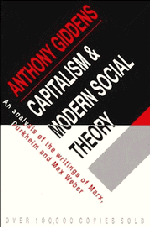Book contents
- Frontmatter
- Contents
- Acknowledgements
- Preface
- Introduction
- List of abbreviations used
- Dedication
- Part 1 Marx
- Part 2 Durkheim
- 5 Durkheim's early works
- 6 Durkheim's conception of sociological method
- 7 Individualism, socialism and the ‘occupational groups’
- 8 Religion and moral discipline
- Part 3 Max Weber
- Part 4 Capitalism, socialism and social theory
- Postscript: Marx and modern sociology
- Bibliography of works cited in text
- Index
6 - Durkheim's conception of sociological method
Published online by Cambridge University Press: 05 August 2013
- Frontmatter
- Contents
- Acknowledgements
- Preface
- Introduction
- List of abbreviations used
- Dedication
- Part 1 Marx
- Part 2 Durkheim
- 5 Durkheim's early works
- 6 Durkheim's conception of sociological method
- 7 Individualism, socialism and the ‘occupational groups’
- 8 Religion and moral discipline
- Part 3 Max Weber
- Part 4 Capitalism, socialism and social theory
- Postscript: Marx and modern sociology
- Bibliography of works cited in text
- Index
Summary
The notions developed in The Division of Labour constitute the foundations of Durkheim's sociology, and the bulk of Durkheim's subsequent writings represent elaborations of the themes originally set out in that work. This is most obviously true of Durkheim's two major publications prior to the turn of the century: The Rules of Sociological Method (1895) and Suicide (1897). In The Rules, Durkheim explicates the methodological suppositions already applied in The Division of Labour. While the subject-matter of Suicide appears at first sight to be utterly different from The Division of Labour, the themes of the former actually mesh very closely with the latter, both within the context of Durkheim's own thought, and within the framework of nineteenth-century writing upon questions of social ethics more generally. Since the end of the eighteenth century, the study of suicide was used by a variety of writers as a specific problem in terms of which general moral issues could be analysed. Durkheim's analysis in Suicide is based upon the work of such authors, but also takes as its point of departure some of the general conclusions concerning the moral order of different forms of society established in The Division of Labour.
- Type
- Chapter
- Information
- Capitalism and Modern Social TheoryAn Analysis of the Writings of Marx, Durkheim and Max Weber, pp. 82 - 94Publisher: Cambridge University PressPrint publication year: 1971



